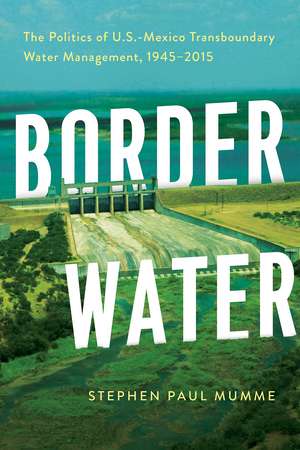Border Water: The Politics of U.S.-Mexico Transboundary Water Management, 1945–2015
Autor Stephen P. Mummeen Limba Engleză Paperback – 21 mar 2023
The international boundary between the United States and Mexico spans more than 1,900 miles. Along much of this international border, water is what separates one country from the other. Border Water provides a historical account of the development of governance related to transboundary and border water resources between the United States and Mexico in the last seventy years.
This work examines the phases and pivot points in the development of U.S.-Mexico border water resources and reviews the theoretical approaches and explanation that impart a better understanding of these events. Author Stephen Paul Mumme, a leading expert in water policy and border studies, describes three important periods in the chronology of transboundary water management. First, Mumme examines the 1944 Water Treaty, the establishment of the International Boundary and Water Commission (IBWC) in 1945, and early transborder politics between the two governments. Next, he describes the early 1970s and the rise of environmentalism. In this period, pollution and salinization of the Colorado River Delta come into focus. Mumme shows how new actors, now including environmentalists and municipalities, broadened and strengthened the treaty’s applications in transboundary water management. The third period of transborder interaction described covers the opening and restricting of borders due to NAFTA and then 9/11.
Border Water places transboundary water management in the frame of the larger binational relationship, offering a comprehensive history of transnational water management between the United States and Mexico. As we move into the next century of transnational water management, this important work offers critical insights into lessons learned and charts a path for the future.
This work examines the phases and pivot points in the development of U.S.-Mexico border water resources and reviews the theoretical approaches and explanation that impart a better understanding of these events. Author Stephen Paul Mumme, a leading expert in water policy and border studies, describes three important periods in the chronology of transboundary water management. First, Mumme examines the 1944 Water Treaty, the establishment of the International Boundary and Water Commission (IBWC) in 1945, and early transborder politics between the two governments. Next, he describes the early 1970s and the rise of environmentalism. In this period, pollution and salinization of the Colorado River Delta come into focus. Mumme shows how new actors, now including environmentalists and municipalities, broadened and strengthened the treaty’s applications in transboundary water management. The third period of transborder interaction described covers the opening and restricting of borders due to NAFTA and then 9/11.
Border Water places transboundary water management in the frame of the larger binational relationship, offering a comprehensive history of transnational water management between the United States and Mexico. As we move into the next century of transnational water management, this important work offers critical insights into lessons learned and charts a path for the future.
Preț: 308.55 lei
Nou
Puncte Express: 463
Preț estimativ în valută:
59.04€ • 63.14$ • 49.23£
59.04€ • 63.14$ • 49.23£
Carte indisponibilă temporar
Doresc să fiu notificat când acest titlu va fi disponibil:
Se trimite...
Preluare comenzi: 021 569.72.76
Specificații
ISBN-13: 9780816548309
ISBN-10: 0816548307
Pagini: 432
Ilustrații: 14 b&w illustrations, 11 tables
Dimensiuni: 152 x 229 x 33 mm
Greutate: 0.54 kg
Editura: University of Arizona Press
Colecția University of Arizona Press
ISBN-10: 0816548307
Pagini: 432
Ilustrații: 14 b&w illustrations, 11 tables
Dimensiuni: 152 x 229 x 33 mm
Greutate: 0.54 kg
Editura: University of Arizona Press
Colecția University of Arizona Press
Notă biografică
Stephen Paul Mumme is a professor of political science at Colorado State University with a long-time research interest in U.S.-Mexico water and environmental policies. He is recipient of the Association for Borderlands Studies’ Lifetime Achievement Award.
Recenzii
“Mumme’s work is a towering achievement, the distillation of decades of careful observation, research, and interaction with key figures and scholars in the field. The framework outlined in this book and its magisterial insights into the stature of the 1944 Water Treaty set the standard for the field for decades to come.”—Evan R. Ward, author of Border Oasis: Water and the Political Ecologyof the Colorado River Delta, 1940–1975
“In this extensively researched monograph, Stephen Paul Mumme tells a fascinating history—or more accurately, fascinating histories—about how the International Boundary and Water Commission (IBWC) was born with the signing of the 1944 Water Treaty by the United States and Mexico just as World War II was ending. Mumme then explores three distinct phases of the IWBC’s history that unfolded due to the treaty’s existence and examines how well the IBWC has met the many challenges it has faced. Mumme closes with valuable lessons learned and insightful thoughts about what the U.S.-Mexico border region and the IBWC may see in their shared history of water diplomacy.”—Christopher Brown, New Mexico State University
“In this extensively researched monograph, Stephen Paul Mumme tells a fascinating history—or more accurately, fascinating histories—about how the International Boundary and Water Commission (IBWC) was born with the signing of the 1944 Water Treaty by the United States and Mexico just as World War II was ending. Mumme then explores three distinct phases of the IWBC’s history that unfolded due to the treaty’s existence and examines how well the IBWC has met the many challenges it has faced. Mumme closes with valuable lessons learned and insightful thoughts about what the U.S.-Mexico border region and the IBWC may see in their shared history of water diplomacy.”—Christopher Brown, New Mexico State University
Descriere
Border Water places transboundary water management in the frame of the larger binational relationship, offering a comprehensive history of transnational water management between the United States and Mexico. As we move into the next century of transnational water management, this important work offers critical insights into lessons learned and charts a path for the future.
